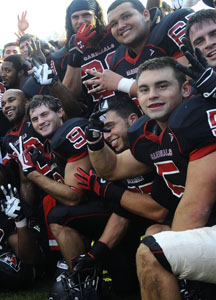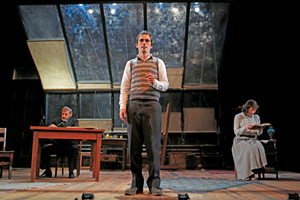Conversations: Pride Amid Protests
Vera Schwarcz discusses what the Beijing Olympics and the controversy surrounding them mean to the Chinese.
By Corrina Balash Kerr
During spring semester 2008, Vera Schwarcz, professor of history and East Asian Studies, taught The Problem of Truth in Modern China—with a focus on ways of expressing and suppressing truth in the 19th and 20th centuries—just as demonstrations against China’s hosting of the summer Olympic games were occurring across the world. She devoted a good portion of her class to discussing the divisive current event. Present in Tiananmen Square during the events of 1989, Schwarcz has a unique perspective on the Chinese point of view.
CORRINA BALASH KERR: How does the theme for the Beijing Olympics, “One World, One Dream,” represent Chinese culture?
VERA SCHWARCZ: The protest movements have challenged the language of the Olympics’ theme with accusations such as “one world, one genocide.” These protests make it appear as if China’s slogan is either ridiculous or obscene. I think, rather, that is part of the extreme views we’re hearing on the streets of Melbourne, Paris, London, or wherever the Olympic torch is being attacked, assaulted, or criticized.
Inside China, this theme represents an effort to accomplish two goals: One is to tell the world that China is part of a global community and thus has the right to put forth a formula that symbolizes her own place in the world. China has joined many organizations on the world’s terms (through participating in the World Bank, the United Nations, etc.).
At the same time, very consciously, this theme draws upon the traditional Chinese ideal of tian xia (meaning all under heaven), which is one of the oldest Chinese expressions. I think that the tian xia yi jia (all under heaven are one family) is a longstanding Confucian ideal. To be sure, the Olympic slogan, internally in Communist China, can be thought to also mean “Shut up, be quiet, we’re going to join the world community, look nice, be nice.” Still, the idea of a universal brotherhood in China runs very deep—it comes from an ancient utopian vision of world community. Also, 19th-century Chinese reformers took on this ideal and promoted a very cosmopolitan utopianism, a homegrown vision of a world without national boundaries or restrictions.
CBK: So this point of view extends to more than just the Olympics?
VS: Currently, China’s ruling Communist Party espouses a “harmonious” society. There is an effort to create harmony and make China more socially cohesive after economic gains have created huge fissures (between suburban/rural, rich/poor, Han Chinese/minorities) in China’s society.
Although “One World, One Dream” is public relations, in China, there is traditionally less concern for the gap between the “is” and the “ought” than in Western philosophy. Whereas Westerners are obsessed with absolute truths, Confucius said, “Let the father be a father, let a ruler be a ruler”—let them live up to what they already are. So it’s PR, but it is also a slogan that is pushing reality in a more positive direction.
CBK: Explain the different concepts of friendship in China.
VS: The Maoist, narrow-minded view of friendship used to be: “You agree with me on all matters.” When Kevin Rudd, the prime minister of Australia, spoke at Peking University in April, he spoke in Mandarin about a different kind of friendship. Rudd used not the Communist term for friendship (youyi) but the more ancient term (zhengyou), meaning “the true friend who dares to disagree.”
Although people might disagree with China’s role in Tibet, they can disagree without rejecting all of China’s culture and citizens.
Culturally, Westerners need to develop a way of dealing with the Olympics that is not seen as trashing China’s coming-out party. When the Olympics are shunned or boycotted, it appears to the Chinese people as if a wedding guest insisted on spoiling the wedding party.
CBK: How should Americans act toward China during the Olympic games?
VS: We can consider what it might be like if we, as guests, boycotted the opening ceremonies. Steven Spielberg’s refusal to stage the Olympic games’ opening ceremony was seen as a slap in the face because it was an honor to be asked in the first place.
CBK: Are there things that Americans can do leading up to the games that will promote good Chinese-American relations?
VS: Learn some Chinese words, much like many ordinary citizens in China are learning English. Learn more about Chinese history—both the recent and more distant wounds, the injuries of national and cultural pride that linger from the long period of imperialism in the 19th century.
CBK: What are some misconceptions that people outside of China have about China’s relationship with Tibet?
VS: To say that the Chinese are blindly committing genocide in Tibet is too simplistic. The Chinese are not out to kill Tibetans. They might not understand fully the political issues concerning religious freedom. Communism certainly, but even Confucianism, is deeply secular—unlike the worshipful lifestyle of most Tibetans, who cling to the Dalai Lama as a god.
There is very little in this culture, traditionally, that is genocidal. There is a lot that affirms the unity of all human beings, the cherishment of human life. It’s very complicated. To be sure, China’s current regime is communist and rather repressive; it is certainly not democratic—although there have been huge changes in matters of human rights in the past two decades. We know that. The question is, What do we do with that knowledge?
The tragedy unfolding in Darfur is not because the Chinese are selling guns; everyone is selling guns. China has tried to work on a compromise between warring factions. China has helped work on negotiations to de-escalate the nuclear situation in North Korea. It’s joined the UN in sanctions. If anyone can stop a nuclear holocaust in North Korea, it’s China. Quietly, behind the scenes, China is also doing a great deal in the Middle East to help achieve peace.
CBK: Describe the openness in China before the events at Tiananmen Square in 1989.
VS: For a few brief weeks between May 4 and May 20, there was genuine freedom of the press. If you go back and look at archived news articles, you can see that. After the martial law and the bloody crackdown, China was set back 10 years. Today, journalists cannot even take pictures of Tiananmen Square.
CBK: What role do sports and athletics play in Chinese society?
VS: In America, we consider achievement in sports to be an individual accomplishment. In China, participating in sports is a way of making the national body more vibrant. When Houston Rockets player Yao Ming participates in the Olympics, he is not just Yao Ming, he’s China. Participating in and hosting the Beijing Olympics is a way for China to make up for injurious events of the past.
A student of mine wrote a brilliant thesis on this topic a couple of years ago. Right now, several Wesleyan students are doing intensive research about various aspects of China’s bids for the Olympics—ranging from the economic reasons through the ecological consequences. I am truly impressed by the high level of information and analytical skill being displayed by Wesleyan students on this matter. Our May 1 dialogue on Tibet, China, and the Beijing Olympics, held at Russell House and coordinated by Professor of Philosophy Steve Angle, was a marvelous testimony to the possibility of informed, civil discussion of these complex issues. That evening was, in my view (after three and a half decades of teaching here), one of Wesleyan’s finest hours.
CBK: Can you explain the difference between nationalism and anti-foreign sentiment in China?
VS: There is a difference between nationalism and anti-foreignism in China, although they often look alike.
Historically, in 1919, China’s protest of the Treaty of Versailles was a part of a movement toward nationalism. Students who took part in the May 4th Movement of 1919 were already concerned with the questions of democracy.Nonetheless, when educated young people and ordinary citizens perceive that the West acts too imperialistically and that the injuries of the Opium War are replayed (for example after the U.S. bombing of the Chinese embassy in Yugoslavia)—if China feels injured—then you have an anti-foreign response in which outsiders come under attack.
It’s hard for Westerners to understand the intensity of these sentiments because of our own blinders. We (especially liberal-minded Wesleyan folk) believe that nationalism is a form of narrow-minded prejudice.
CBK: There have been conflicting reports about whether or not Beijing’s pollution will negatively affect athletes. How do you expect the government to respond?
VS: Certainly Beijing is a city suffering from major pollution. This is both an old and a recent problem. Centuries of deforestation on the North China plain have left the capital vulnerable to the yellow winds that sweep in from the Gobi Desert, augmenting respiratory problems each spring. When I lived in Beijing, I often used a facemask while riding a bicycle. In the past two decades, the rapid pace of development made matters much, much worse. At the same time, there had been increased awareness and a huge effort to reduce pollution. Limiting the number of cars in the city center (a difficult challenge due to the huge increase in the number of private cars), the conscientious development of public transportation (including the development of the subway system), and a focused attention to environmentally friendly architecture in the Olympic Village will combine to make the games more bearable.
CBK: Do you expect protests against the Olympic games to escalate?
VS: Keep in mind, I’m a historian; I do not read tea leaves; I do not forecast the future. Any protesters who court resistance (especially armed conflicts such as may be developing in Tibet or in the far West among the Muslim minorities influenced by Al Qaeda) will be met with intense reactions. I hope I’m deadly wrong. I fear, however, that protests may once again end in a bloodbath, as in 1989. This would be terrible for China and the Chinese people.


